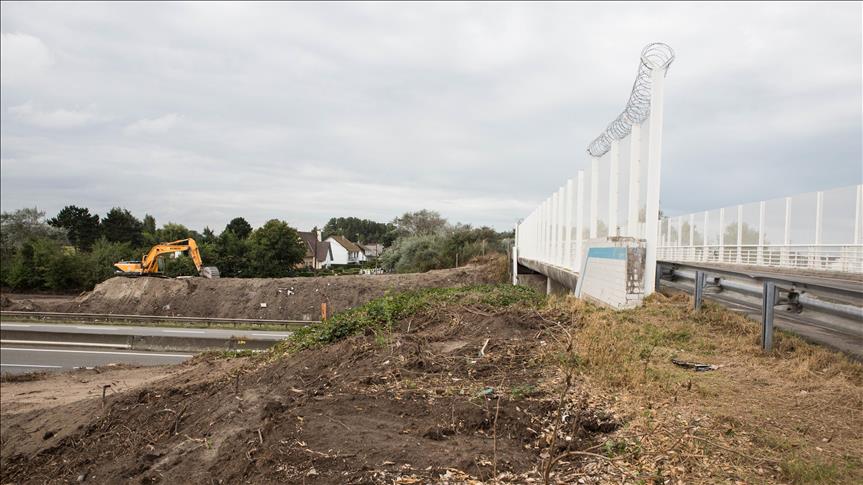 ( Rodrigo Avellaneda - Anadolu Agency )
( Rodrigo Avellaneda - Anadolu Agency )
CALAIS, France
The migrant camp in northern France known colloquially as “the Jungle” does a roaring trade in energy drinks.
Row upon row of Red Bull and Monster Regular cans line the wooden shelves of a makeshift convenience store serving the camp’s mostly male inhabitants.
The caffeine-heavy drinks sell in droves for €1 ($1.12) each and it is little wonder. The dozens of migrants who each night use the cover of darkness to try and hitch a ride on a heavy goods truck need all the energy they can get.
Their coveted destination is Britain, but the British government is funding a new 4-metre-high barrier close to the northern town of Calais that it hopes will stop them trying.
Construction began on Tuesday on the concrete wall that will extend for a single kilometer alongside the motorway to the Calais port where ferries carrying lorries depart day and night for the U.K.
But British tabloids have derided the undertaking, dubbing it “the Great Wall of Calais” and attacking its £2 million ($2.6 million) cost.
Migrants who spoke to Anadolu Agency before the construction work began were similarly dismissive.
‘I will keep trying’
“Of course you can do it, it’s very possible,” said 32-year-old Aziz, with an unconcerned wave of his hand when asked how likely it was to sneak on board a lorry without being caught.
The Albanian migrant worked for 10 years in the western English city of Northampton until he was deported for overstaying his fixed-term visa.
“They keep sending me away and I will just keep trying to come back.”
He flashed a grin: “They can’t stop me.”
Aziz is one of the so-called “economic migrants” – people not fleeing war and destruction, but rather seeking a better life for themselves – that Britain does not want to accept.
But Walid, 25, who travelled over desert and sea from his native Sudan, had a different story.
“There is a genocide in my country – I have no family anymore,” he explained in unfaltering English.
“I will try [to get on a truck] every day. Yesterday I was sick but I will try again tonight.”
“All I want to do is study in Britain,” he said.
The Jungle camp, home to an estimated over 9,000 people according to French authorities, is a sea of plastic tents fanning out in all directions from a main street of wooden buildings that contain restaurants, a community center with a blaring television, and stores selling canned drinks.
‘The children are not waiting’
Young men like Aziz and Walid, who travel alone and are physically capable of scaling fences and chasing fast-moving lorries, make up the majority of dwellers in the camp.
Far less visible but facing far greater risk are the women and solo children, some of them barely teenagers, who are trying to make the same journey to Britain.
“Just yesterday I saw a mother and child, she four-years-old, trying to get inside a truck,” Walid said, his ready smile collapsing into sorrow at the mention of vulnerable children.
“I watched them. I saw them trying to get on lorry and they fell and they got hurt.
“I cried so much.”
Under European asylum rules known as Dublin III, migrants must make their asylum claim in the first safe country they reach, although children are permitted to transfer to another country if they have family members living there.
But according to Britain’s anti-slavery Commissioner Kevin Hyland, children in the camp are risking their lives every day as they wait for British authorities to process their applications.
“Children are not waiting,” he wrote in a letter to U.K. Home Secretary Amber Rudd published on Wednesday.
“Every night they go to their smugglers who have promised to get them across the Channel. Every night they think that this time they will be lucky.
“However, every night each of these children are at risk of exploitation and sadly even dying as they take huge risks to reach the U.K.”
The latest victim was a 14-year-old Afghan, Raheemullah Oryakhel, who died after being hit by a car while trying to climb on a lorry’s roof over the weekend. He was the third child to die this year.
Legal right to join family
Unicef U.K. said Oryakhel had the legal right to join members of his family who are already in the U.K.
“This tragedy must now lead to action,” the agency said in a statement.
“The U.K. must work with the French authorities to get children into appropriate accommodation, where they can have access to care and legal support so they can reach their families safely.
“It’s in the U.K. government’s hands to prevent any more children from being killed.”
Yvette Cooper, a senior lawmaker in the U.K.’s opposition Labour Party, says there is more the U.K. government can do.
“I think they need to have a government official based here, not just in Paris, to work with the authorities in Calais to speed the processes up,” Cooper told Anadolu Agency in an interview conducted before Oryhakhel’s death.
“I think they need to put pressure on the French authorities to speed things up as well.”
The British immigration authorities were spending too long trying to establish whether the children had genuine family members in the U.K. and were not considering the risk they faced in the Calais camp, Cooper added.
Anadolu Agency website contains only a portion of the news stories offered to subscribers in the AA News Broadcasting System (HAS), and in summarized form. Please contact us for subscription options.

